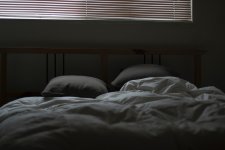QUALITY SLEEP FOR QUALITY SKIN!
Dr Nyamai recommends these tips for getting good sleep and better skin health:
- Not enough sleep worsens existing skin conditions. The increased inflammatory response shows up as increased acne breakouts, increased skin sensitivity, increased allergic contact dermatitis reactions, and increased irritant dermatitis — and more severe conditions mean more treatment and skincare.
- Not enough sleep detracts from your skin's natural beauty. Increased inflammatory cells in the body lead to an increase in the breakdown of collagen and hyaluronic acid, the molecules that give the skin its glow, bounce, and translucency.
- Not enough sleep makes immune-related skin problems worse. Increased inflammation in the body throws off the body's ability to regulate the immune system, which leads not only to getting sick more often but also to flares of immune-related skin diseases such as psoriasis and eczema.
- Not enough sleep results in less beauty. While you're sleeping, the body's hydration rebalances. Skin is able to recover moisture, while excess water in general in the body is processed for removal. Not getting enough sleep results in poor water balance, leading to puffy bags under your eyes and under-eye circles, as well as dryness and more visible wrinkles.
- Not enough sleep accelerates the ageing process. During deep sleep, the rise in growth hormones allows damaged cells to become repaired. Without the deeper phases of sleep, this won't occur, allowing daily small breakdowns to accumulate instead of being reversed overnight. This results in more noticeable signs of ageing.
- Not enough sleep contributes to weight gain. Sleep also helps with weight management, which is good for your skin. Sleep makes you feel less hungry. Recent studies have linked sleep deprivation to excess snacking and calorie consumption.
Dr Nyamai recommends these tips for getting good sleep and better skin health:
- Don't eat a big meal too late in the day.
- Drink plenty of water throughout the day, but not late at night.
- Sleep under a warm blanket in a cool, dark, quiet room.
- Keep electronics out of the bedroom.
- Use breathable cotton sheets and wash them regularly, so they don't collect dust mites and bacteria.
- Use laundry detergents that don't have strong fragrances, which can be irritating to the skin.
